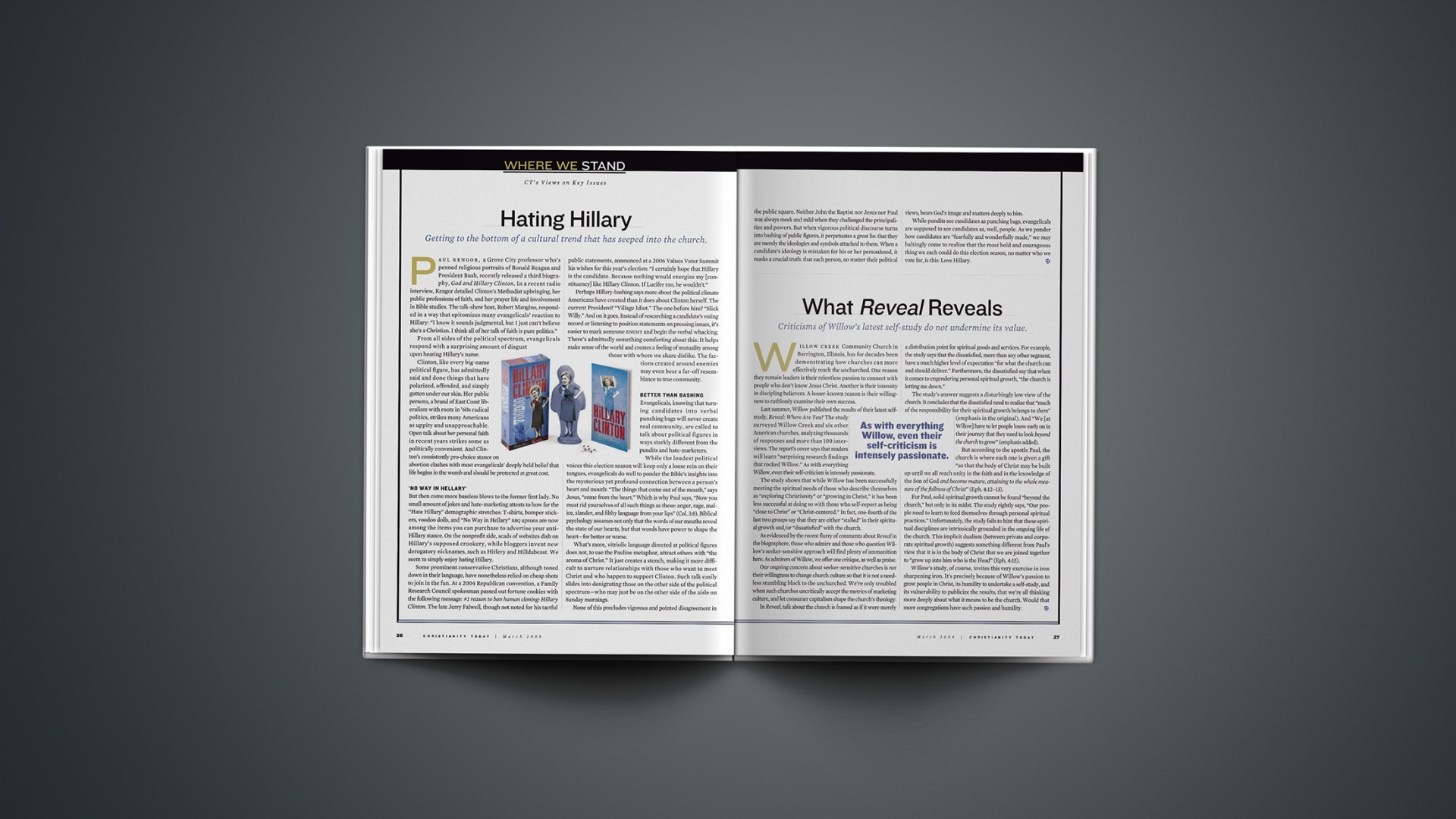Paul Kengor, a Grove City professor who's penned religious portraits of Ronald Reagan and President Bush, recently released a third biography, God and Hillary Clinton. In a recent radio interview, Kengor detailed Clinton's Methodist upbringing, her public professions of faith, and her prayer life and involvement in Bible studies. The talk-show host, Robert Mangino, responded in a way that epitomizes many evangelicals' reaction to Hillary: "I know it sounds judgmental, but I just can't believe she's a Christian. I think all of her talk of faith is pure politics."
From all sides of the political spectrum, evangelicals respond with a surprising amount of disgust upon hearing Hillary's name.
Clinton, like every big-name political figure, has admittedly said and done things that have polarized, offended, and simply gotten under our skin. Her public persona, a brand of East Coast liberalism with roots in '60s radical politics, strikes many Americans as uppity and unapproachable. Open talk about her personal faith in recent years strikes some as politically convenient. And Clinton's consistently pro-choice stance on abortion clashes with most evangelicals' deeply held belief that life begins in the womb and should be protected at great cost.
'No Way in Hellary'
But then come more baseless blows to the former first lady. No small amount of jokes and hate-marketing attests to how far the "Hate Hillary" demographic stretches: T-shirts, bumper stickers, voodoo dolls, and "No Way in Hellary" BBQ aprons are now among the items you can purchase to advertise your anti-Hillary stance. On the nonprofit side, scads of websites dish on Hillary's supposed crookery, while bloggers invent new derogatory nicknames, such as Hitlery and Hilldabeast. We seem to simply enjoy hating Hillary.
Some prominent conservative Christians, although toned down in their language, have nonetheless relied on cheap shots to join in the fun. At a 2004 Republican convention, a Family Research Council spokesman passed out fortune cookies with the following message: #1 reason to ban human cloning: Hillary Clinton. The late Jerry Falwell, though not noted for his tactful public statements, announced at a 2006 Values Voter Summit his wishes for this year's election: "I certainly hope that Hillary is the candidate. Because nothing would energize my [constituency] like Hillary Clinton. If Lucifer ran, he wouldn't."
Perhaps Hillary-bashing says more about the political climate Americans have created than it does about Clinton herself. The current President? "Village Idiot." The one before him? "Slick Willy." And on it goes. Instead of researching a candidate's voting record or listening to position statements on pressing issues, it's easier to mark someone ENEMY and begin the verbal whacking. There's admittedly something comforting about this: It helps make sense of the world and creates a feeling of mutuality among those with whom we share dislike. The factions created around enemies may even bear a far-off resemblance to true community.
Better than bashing
Evangelicals, knowing that turning candidates into verbal punching bags will never create real community, are called to talk about political figures in ways starkly different from the pundits and hate-marketers.
While the loudest political voices this election season will keep only a loose rein on their tongues, evangelicals do well to ponder the Bible's insights into the mysterious yet profound connection between a person's heart and mouth: "The things that come out of the mouth," says Jesus, "come from the heart." Which is why Paul says, "Now you must rid yourselves of all such things as these: anger, rage, malice, slander, and filthy language from your lips" (Col. 3:8). Biblical psychology assumes not only that the words of our mouths reveal the state of our hearts, but that words have power to shape the heart—for better or worse.
What's more, vitriolic language directed at political figures does not, to use the Pauline metaphor, attract others with "the aroma of Christ." It just creates a stench, making it more difficult to nurture relationships with those who want to meet Christ and who happen to support Clinton. Such talk easily slides into denigrating those on the other side of the political spectrum—who may just be on the other side of the aisle on Sunday mornings.
None of this precludes vigorous and pointed disagreement in the public square. Neither John the Baptist nor Jesus nor Paul was always meek and mild when they challenged the principalities and powers. But when vigorous political discourse turns into bashing of public figures, it perpetuates a great lie: that they are merely the ideologies and symbols attached to them. When a candidate's ideology is mistaken for his or her personhood, it masks a crucial truth: that each person, no matter their political views, bears God's image and matters deeply to him.
While pundits see candidates as punching bags, evangelicals are supposed to see candidates as, well, people. As we ponder how candidates are "fearfully and wonderfully made," we may haltingly come to realize that the most bold and courageous thing we each could do this election season, no matter who we vote for, is this: Love Hillary.
Copyright © 2008 Christianity Today. Click for reprint information.
Related Elsewhere:
"Do Evangelicals Really Prefer Hillary to Obama? No One Knows For Sure" is also posted today.
Our full-coverage section on the 2008 campaign also includes "What Does Hillary Believe?" and "Hillary's Spiritual Formation."
CT Liveblog has more news and commentary on the campaign.










